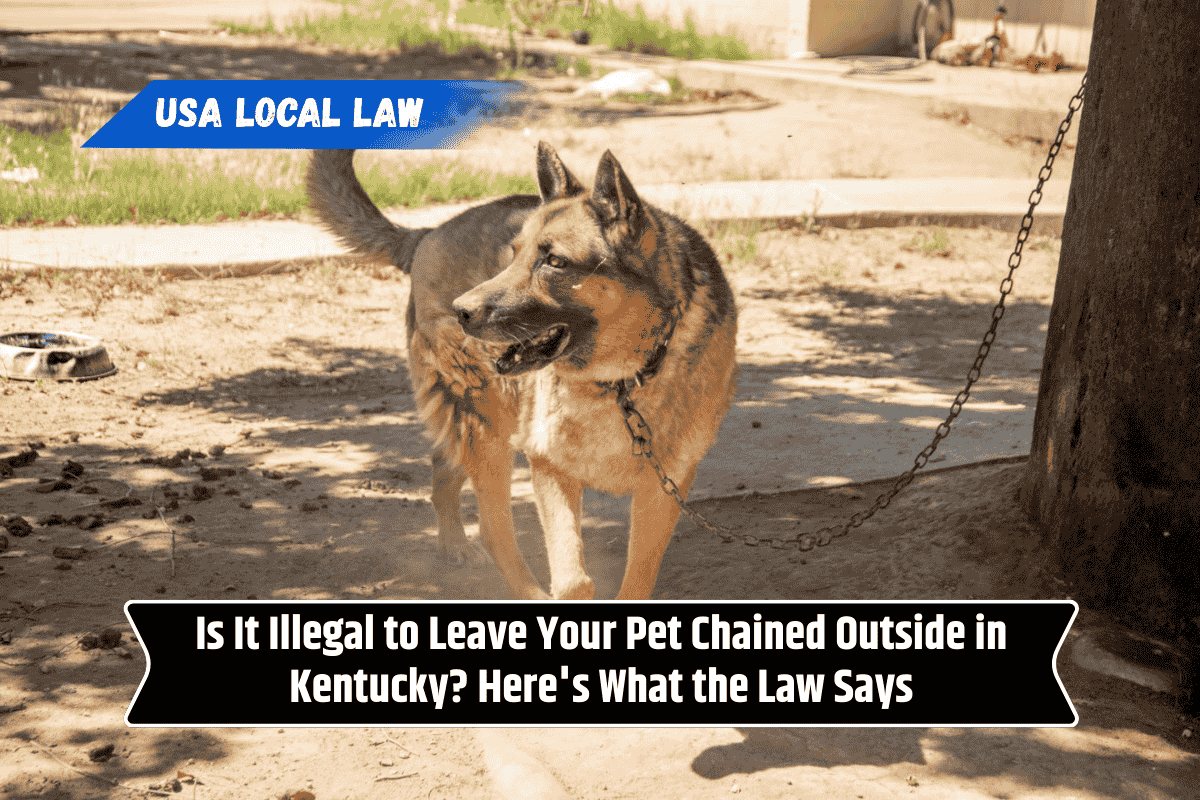In Kentucky, chaining or tethering pets—especially dogs—is a common practice in some rural and urban areas. But many pet owners don’t realise that certain ways of chaining a dog can actually break the law.
If you’re a pet parent in Kentucky, it’s important to understand what the law says about keeping your furry friend tied up outside. This guide breaks down the legal rules and what you need to do to stay on the right side of the law.
Kentucky State Law on Tethering Pets
Kentucky does not have a statewide law that directly bans chaining or tethering pets. However, there are general animal cruelty laws that apply when a pet is kept in inhumane or dangerous conditions.
If a pet is found chained for too long or in poor weather with no shelter, the owner can face serious legal consequences under animal cruelty statutes.
Key points from state animal cruelty laws:
Pets must be given proper shelter, clean water, and enough food.
It is illegal to keep animals in a way that causes pain, suffering, or danger to their health.
Repeated or long-term chaining that harms the animal may be considered cruelty or neglect.
So while chaining a pet isn’t completely banned by state law, the way you do it matters a lot.
Local Tethering Laws in Kentucky Cities and Counties
Many counties and cities in Kentucky have passed their own laws that go beyond the state rules. In some places, it’s illegal to leave your pet chained outside for long hours—or at all.
Here are a few examples:
Louisville (Jefferson County):
Tethering is only allowed if the owner is present and supervising the pet.
You can’t leave a dog tied up during extreme weather (hot, cold, storms).
The tether must be at least 10 feet long and not cause injury or discomfort.
Lexington (Fayette County):
Dogs can’t be tethered for more than 15 minutes without supervision.
Tether must be attached to a harness, not the collar.
No chaining during severe weather conditions.
Bowling Green and other cities:
Some completely ban unsupervised tethering.
Penalties can include fines, warnings, or animal removal.
Always check with your local animal control office or city ordinance to understand the rules where you live.
What Type of Tethering Is Considered Cruel?
If you must tether your pet, Kentucky laws and humane standards say it must be done safely. Tethering may be considered cruelty if:
The chain is too short (under 10 feet or restricts movement)
The animal is left without shelter in bad weather
The collar or chain causes injury or cuts into the skin
The pet has no access to water or food
The animal is left tied up for hours with no breaks
Cruelty charges in Kentucky can lead to fines, pet removal, or even jail time in severe cases.
What Should Responsible Pet Owners Do?
If you want to keep your dog outside for any period of time, make sure you follow these safety tips:
Use a harness, not a collar, to avoid neck injuries
Make sure the tether is at least 10 feet long and allows freedom to move
Provide fresh water, food, and shade or shelter
Avoid chaining your dog for long periods or in harsh weather
Check your local laws before tethering your pet outside
While Kentucky doesn’t have a statewide ban on chaining pets outside, the law is clear: you must care for your pet properly, and neglect or cruelty is a punishable offence. Local rules in places like Louisville and Lexington make it even stricter, limiting how and when pets can be tethered.
If you’re unsure about the laws in your area, contact your local animal control agency. Being a responsible pet owner means more than feeding your pet—it means keeping them safe, healthy, and treated with kindness every day.
